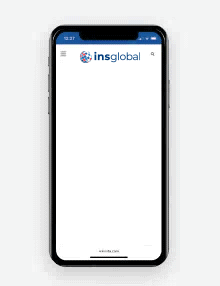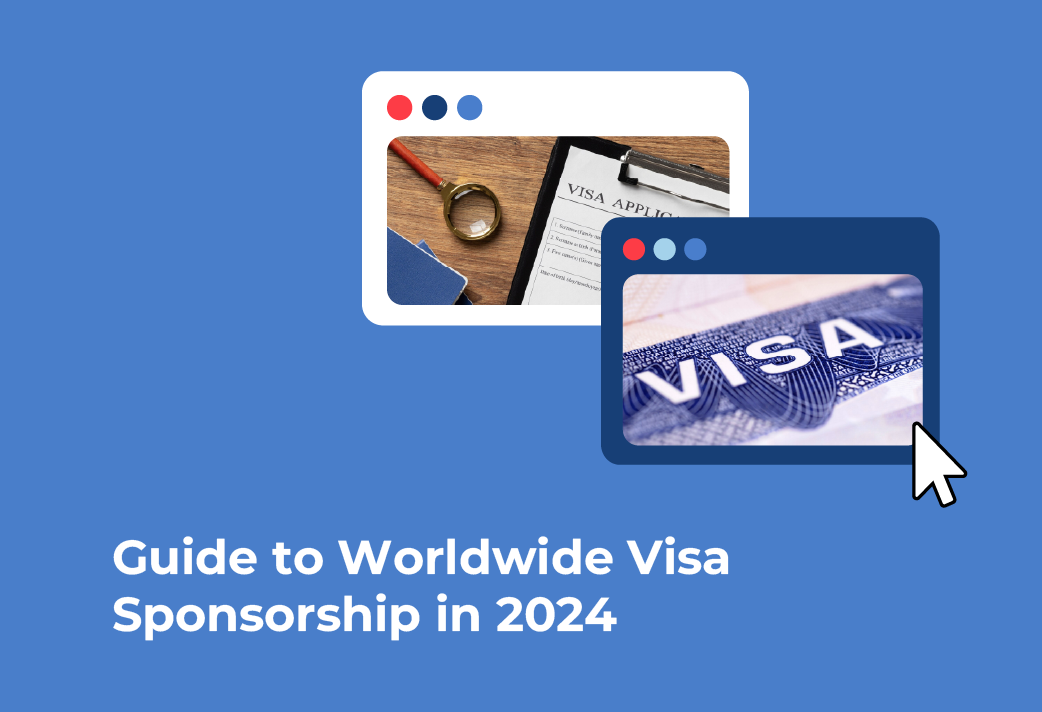In 2025, globalization continues to reshape the business landscape, and companies are increasingly open to seeking talent from across the globe. As a result, worldwide visa sponsorship schemes have become essential tools for businesses looking to bring in skilled workers from other countries.
Today, understanding visa sponsorship is crucial whether you are a start-up eyeing global expansion or an established multinational corporation. This comprehensive guide will walk you through everything you need to know about worldwide visa sponsorship in 2025.

Tired of scrolling? Download a PDF version for easier offline reading and sharing with coworkers
What is Visa Sponsorship?
Visa sponsorship is a process by which an employer sponsors a foreign worker for a visa, allowing them to work in a specific country. This type of sponsorship typically involves the employer taking on extra legal and financial responsibility for the employee while working abroad, such as in the case of UK visa sponsorship. In this case, the employer essentially vouches for the employee’s employment and stay in order to bring them into a talent pool, ensuring they meet all requirements and conditions set by the host country.
Visa sponsorship is particularly useful for companies looking to hire international talent as it provides a legal pathway for foreign nationals to be brought into new markets. In fact, in many countries, securing a work visa can be nearly impossible without sponsorship.
How to Get Worldwide Visa Sponsorship for Your Employees: What to Do in the Beginning
Securing visa sponsorship for your employees involves complex steps and the ability to ensure total compliance with various local labor regulations. These steps can vary significantly from one country to another, but key steps typically involved include:
- Identify the Need for Sponsorship – Before any action is taken, it’s necessary to know which positions you are hiring for require foreign talent, and to assess the necessity of visa sponsorship for these roles. This may require asking certain questions depending on the market being hired for. For example, when hiring in the EU, visa sponsorship will only be necessary for non-EU/EEA nationals.
- Research Visa Types – Different countries offer a variety of visa categories based on specific job roles, skills, and durations of stay. Once necessity has been determined, the first step in the process will be to research the appropriate visa types that match your employment needs.
- Obtain Labor Certification – In some countries, you may need a labor certification to prove that hiring a foreign worker will not negatively impact the local labor market. In these cases, submit a petition to the relevant immigration authorities, including all required documentation and fees.
- Recruitment and Eligibility Checks – Advertise the job position, and in the case of countries with limits or restrictions on foreign hiring, leave plenty of time before making a decision to demonstrate that no qualified local candidates are available.
- Prepare Documentation – Like with any visa process, a number of different documents will be needed during the application. Gather all necessary documents, including employment contracts, proof of business operations, financial statements, etc. At this point, you may need to have already zeroed in on potential candidates or provided job offers, therefore timing will be key.
- Submit Application – File the visa application with the relevant immigration authorities, whether these are in your country of operation or consular services in the applicant’s country of origin, ensuring all forms are accurately completed and all requirements are met.
- Visa Issuance and Arrival – The visa will be issued upon approval, allowing the employee to enter and work in the host country. In some cases, the holder will have to make the move within a certain amount of time to activate the visa.
- Once the trip has been made and the visa holder arrives in-country, ensure the employee complies with all local regulations, including registering with local authorities and obtaining necessary permits.
- Follow Up – Stay in contact with immigration officials and your employees during the application to ensure smooth processing. Address any issues promptly as they appear to avoid delays that can stall or damage projects.
What are the Main Types of Worldwide Visa Sponsorships Available to Employees?
Worldwide visa sponsorship can vary widely depending on the country and the nature of the employment. Here are some common types of visa sponsorship programs you may find when researching potential options:
Work Visas
These are the most common types of visas for employment purposes. They generally allow foreign nationals to work in a host country for a specific period, though these visas may require additional steps or permits post-application. Typical examples of work visas include the H-1B visa in the United States and the Tier 2 (General) visa in the United Kingdom.
Intra-Company Transfer Visas
These visas are designed for employees of multinational companies being transferred to a branch or subsidiary in another country. Less common than general work visas as they may allow companies to share some responsibilities for the mployee with their home office, examples include the L-1 visa in the United States and the ICT visa in France.
Temporary Skill Shortage Visas
Less common still, these visas are issued to address temporary labor shortages in specific industries and may include hard limits or the period of eligibility or work prospects. One example of this visa sponsorship type is the Temporary Skill Shortage (TSS) visa in Australia.
Permanent Residence Visas
While many visa sponsorship schemes include the right to reside in the country of operation, some visas are specifically designed to offer a pathway to permanent residence. This allows employees to plan long-term and eventually settle permanently in the host country. Famous examples include the EB-2 and EB-3 visas in the United States.
The Benefits of Visa Sponsorship
Visa sponsorship offers numerous benefits to both employers and employees:
- Access to Global Talent – Through visa sponsorship, companies can tap into a global pool of skilled workers, bringing diverse perspectives and expertise to their teams.
- Competitive Advantage – Attracting top international talent can provide a competitive edge in the global marketplace over those businesses focused on only hiring locally.
- Employee Loyalty – Sponsored employees often show greater loyalty and commitment to their employers due to the acknowledgment of the steps taken to secure their position. In many cases, sponsorship fosters a greater sense of security and belonging within a new company over remote work options.
- Cultural Exchange – Hiring international employees promotes cultural exchange within the workplace, fostering innovation and creativity.
Key Requirements for Visa Sponsorship
The specific requirements and procedures for visa sponsorship vary greatly depending on the country and visa type. However, common elements include:
- Proof of Employment – Documentation proving that the employee has a legitimate job offer from your company. This may require visa sponsorship applicants to hold a promise of employment or a preliminary contract before starting the process.
- Financial Stability – Evidence that your company is financially stable and capable of supporting the sponsored employee.
- Compliance with Labor Laws – All new employees will be subject to local labor laws, including wage requirements and working conditions.
- Background Checks – When bringing in workers from abroad or sending workers overseas, conducting necessary background checks on employees to ensure they meet the host country’s typically enhanced security standards. This step can take time and may require cooperation with officials in the visa applicant’s home country.
The Challenges of Visa Sponsorship
Visa sponsorship, while beneficial, comes with its own set of challenges:
- More Complex Regulations – Labor laws can be complicated for local employees, but navigating the complex and ever-changing immigration regulations of overseas markets adds a new and daunting level of challenge for employers.
- Lengthy Process – The visa sponsorship process can be time-consuming, often taking several months, with interviews, documentation, and delays being common.
- Extra Costs – While often pursued to take advantage of lower standard salaries in other countries, sponsoring a visa can end up being more expensive because of the processes involved, including application fees, legal fees, and potential relocation expenses.
- Uncertainty – There is always an element of uncertainty that has to be factored into decisions. For example, visa applications can be denied or delayed for various reasons, leaving employers and employees in limbo.
Use INS Global Expansion Services as a Fast-track to Worldwide Visa Sponsorship
Navigating the complexities of visa sponsorship can be overwhelming, but you don’t have to do it alone.
Global Employer of Record (EOR) service providers like INS Global offer comprehensive worldwide expansion services that can simplify the process for you when hiring overseas. From identifying the best path to visa sponsorship success to handling all the documentation and compliance involved, our experts can support you every step of the way.
The world of visa sponsorship can be a complex but rewarding process. Whether you are seeking to bring in top talent from around the world or expand your operations internationally, understanding how to achieve safe and cost-effective visa sponsorship is the first step to achieving your global business goals.
Contact our team of global expansion advisors today to see how partnering with experts like INS Global can ensure a smooth and efficient process, allowing you to focus on what matters most – growing your business.
FAQs – Visa Sponsorship
How Long is Visa Sponsorship Valid for?
The validity of visa sponsorship varies heavily depending on the visa type and rules of the host country. Some work visas are valid for a few months to years with the possibility of renewal, while others may provide a pathway to permanent residency.
What are the Costs of Visa Sponsorship?
Visa sponsorship costs can include all sorts of government filing fees, legal fees, as well as indirect expenses such as relocation costs.
Can an Employer Terminate a Visa Sponsorship?
Yes, an employer can terminate a visa sponsorship, but this must be done carefully as it can have significant implications for the employee that goes beyond standard termination. Terminated employees in this situation may need to leave the host country, so understanding the legal obligations and potential consequences involved before terminating sponsorship is important.
Which Types of Visas Don’t Require Sponsorship?
Some visas do not require employer sponsorship. Examples include tourist visas, student visas, and investor or self-employment visas, as these visas typically have different requirements and do not involve the employer in the application process.
However, be careful when considering using these visa types, as they are not intended for traditional employment relationships. Willful misclassification of employees as self-employed can lead to serious fines, penalties, or even criminal charges.


SHARE